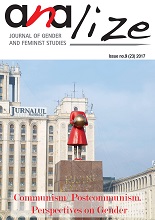»I was both the man and the woman«: Gender Stratification in Communist and Post-Communist Romania
»I was both the man and the woman«: Gender Stratification in Communist and Post-Communist Romania
Author(s): Gerard WeberSubject(s): Gender Studies, Welfare services, Post-Communist Transformation, Human Resources in Economy
Published by: Societatea de Analize Feministe AnA
Keywords: gender inequality; work; retirement; pensions; communism; post-communism;
Summary/Abstract: This paper examines the recent history of gender stratification in Romania. Based upon research among working-class retirees in Galaţi, it juxtaposes the gendering of work in the communist period with that of retirement in the post-communist years. That women were burdened with labor in the domestic realm and either, or sometimes both, the agricultural or industrial sectors during the communist period only to enter protracted poverty when they retired after 1989 is underscored, the life histories of two women illustrating this process. One is of a woman who labored in textiles while raising children all but alone because her husband held work outside the city. The other is of a woman who conducted agriculture while also caring for the household. Both women suffered physically from the work they performed, but the demands also had psychological ramifications. The textile worker describes feeling pressure to ensure that she reared children who would not become vagabonds, while the other reflects on the anxiety that she suffered attempting to do all her work. A key point that emerges from these life histories is that women arguably braved even more intense expectations than men upon their work lives. Greatly exacerbating this injustice was the fact that women were never compensated for waged labor at the same rates as men, and their household tasks were never remunerated at all. In addition to the lower pay, women accrued smaller pensions than men if they earned one at all. Retirement in the post-communist has as a result been crushing particularly to women. They have not had the income to manage expenses in a rapidly changing economy. This has made it difficult for women to bear the costs of necessities, and it impels them to engage in range of strategies that often heighten the stress that poverty already generates.
Journal: AnALize: Revista de studii feministe
- Issue Year: 2017
- Issue No: 9 (23)
- Page Range: 13-30
- Page Count: 18
- Language: English

